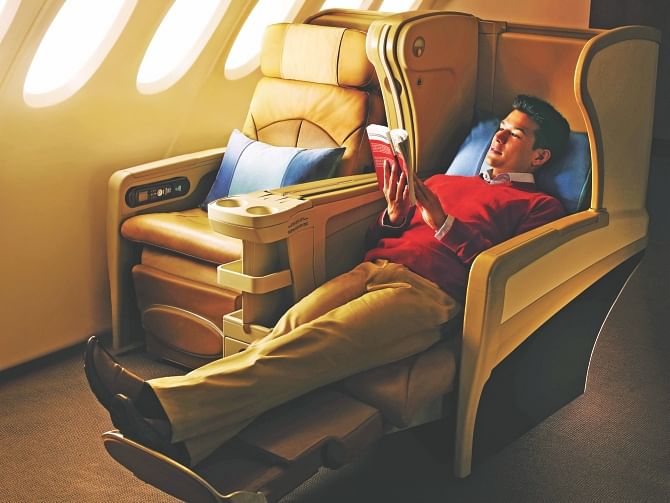Aviation sector on the mend

The aviation sector is slowly returning to stable growth following a year of slow business due to political turmoil.
Industry people said like all other businesses, the unrest throughout 2013 also hit the aviation sector. As a result, passenger count went down by about 30 percent from a year ago.
“Things have started to improve slowly in recent times. Over the last two months, we have seen businesses getting back to normal,” said Nelson Low Kah Hock, general manager of Singapore Airlines' Bangladesh operations.
He, however, said it would take time to return to pre-unrest levels.
“In Bangladesh, 2012 was really a boom year for the aviation sector. It was really, really good business for everybody, not only for the sector, but for all businesses,” he said in a recent interview.
Hock was not allowed to disclose the exact figures, but said his company's business is still 10 percent behind the 2012 average.
At present, the average passenger load factor for the airline is 70 to 80 percent. Sometimes, it goes above 90 percent, particularly just before the weekends or holidays, he said.
In 2012, the average passenger load factor for the company was 80 to 90 percent.
As a premium airline, Singapore Airlines is the carrier of choice for big conglomerates and multinational companies in Bangladesh, with more than 50 corporate clients in its books.
In the last two decades, the aviation sector has grown in tandem with the growth of the economy, due to which more airlines are now operating in Bangladesh, said Hock, who assumed his current role in October 2012.
Over the last 20 years, the economy has grown significantly, as a result of which people's disposable income has increased.
“More people can afford to travel. Businessmen are making more money and are travelling more frequently, both for leisure and business. As a whole, the aviation business has grown.”
When it started operation in Bangladesh in 1986, Singapore Airlines operated only two flights a week. Now, it is operating seven flights per week and has more than 70 staff in Bangladesh.
Hock, who studied mechanical engineering at Nanyang Technological University, has been with Singapore Airlines since 2001 and Bangladesh has been his first overseas posting.
Despite the steady growth in passengers, local operators are struggling. GMG Airlines has closed down, and United Airways is said to be in financial difficulty.
In fact, the airline industry is not doing well globally because of high jet fuel price, Hock said. Fuel cost accounts for up to 40 percent of the overall cost in the aviation business.
“Generally speaking, the public wants cheaper flights, so the airline fares are coming down. But on the other hand, operating cost is going up. Running an airline has become harder -- to become profitable is very challenging in this landscape.”

However, Hock is optimistic about the business prospect in the country.
“Bangladesh is a growing market -- that presents a lot of opportunities, not only for the airlines, but also for the travel agents.”
He said the number of foreigners travelling to Bangladesh is increasing; a lot of expatriates too are coming.
“That only means one thing: a lot of foreign companies are coming to Bangladesh to invest. That is a good sign for the country, having more foreign direct investment to grow the economy.”
“You have huge land and a workforce. There is a lot of growth potential. Had there been no political unrest and infrastructure bottlenecks, the economy could have grown by more than 8 percent annually. This is achievable.”
About any possible expansion plan, the 40-year-old Singaporean said: “If the growth in Bangladesh continues and the demand for air travel increases, it will give us an opportunity to explore the possibility of increasing our flight frequency.”
Hock admitted that the carrier's fares can be higher than other airlines. “We pride ourselves on the products and services we offer, from seating comfort to food selection to in-flight entertainment to crew service. Our fares are still competitive against our main competitors.”
Through Singapore Airlines, Dhaka is connected to 65 cities around the world.
Founded in 1972, Singapore Airlines is one of the most respected travel brands around the world. In the year to March 2014, Singapore Airlines' revenues stood at S$12.5 billion and profits S$256 million.

 For all latest news, follow The Daily Star's Google News channel.
For all latest news, follow The Daily Star's Google News channel. 



Comments